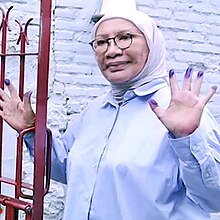Ratna Sarumpaet | |
|---|---|
 | |
| Born | 16 July 1949 |
| Nationality | Indonesian |
| Alma mater | University of Indonesia |
| Occupation(s) | Director, actress, screenwriter, political activist |
| Years active | 1969–2018 |
| Notable work | Jamila dan Sang Presiden |
| Spouse |
Achmad Fahmy Alhady
(m. 1972; div. 1985) |
| Children | Mohamad Iqbal Fathom Saulina Ibrahim Atiqah Hasiholan |
| Parents |
|
Ratna Sarumpaet (born 16 July 1949) is an Indonesian human rights activist, theatrical producer, actress, film director, and writer.[1][2][3] In July 2019 she was sentenced to two years in jail for spreading hoaxes.[4]
Sarumpaet, born into a politically active Christian family in North Sumatra, initially studied architecture in Jakarta. After seeing a play by Willibrordus S. Rendra in 1969, she dropped out and joined his troupe. Five years later, after marrying and converting to Islam, she founded the Satu Merah Panggung; the troupe did mostly adaptations of foreign dramas. As she became increasingly concerned about her marriage and unhappy about the local theatre scene, two years later Sarumpaet left her troupe and began to work in television; she only returned in 1989, after divorcing her abusive husband.
The murder of Marsinah, a labour activist, in 1993 led Sarumpaet to become politically active. She wrote her first original stageplay, Marsinah: Nyanyian dari Bawah Tanah (Marsinah: Song from the Underground), in 1994 after becoming obsessed with the case. This was followed by several other politically charged works, several of which were banned or restricted by the government. Increasingly disillusioned by the autocratic acts of Suharto's New Order government, during the 1997 legislative elections Sarumpaet and her troupe led pro-democracy protests. For one of these, in March 1998, she was arrested and jailed for seventy days for spreading hatred and attending an "anti-revolutionary" political gathering.
After her release, Sarumpaet continued to participate in pro-democracy movements; these actions led to her fleeing Indonesia after hearing rumours that she would be arrested for dissent. When she returned to Indonesia, Sarumpaet continued to write politically charged stageplays. She became head of the Jakarta Art Board in 2003; two years later she was approached by UNICEF and asked to write a drama to raise awareness of child trafficking in Southeast Asia. The resulting work served as the foundation for her 2009 feature film debut, Jamila dan Sang Presiden (Jamila and the President). This film was submitted to the 82nd Academy Awards for Best Foreign Language Film but not nominated. The following year, she released her first novel, Maluku, Kobaran Cintaku (Maluku, Flame of My Love).
- ^ Mansur, Ali (2018-10-04). "Sandiaga: Pupus Kepercayaan Saya kepada Ratna Sarumpaet". Republika Online (in Indonesian). Retrieved 2022-02-02.
- ^ Marhaenjati, Bayu (2019-12-26). "'Best Hoax Creator' Ratna Sarumpaet Freed After 15 Months in Prison". Jakarta Globe. Retrieved 2022-02-02.
- ^ Souisa, Hellena (2018-10-08). "Misinformation, Ratna the hoaxer, and 1965". Indonesia at Melbourne. Retrieved 2022-02-02.
- ^ Cite error: The named reference
:3was invoked but never defined (see the help page).